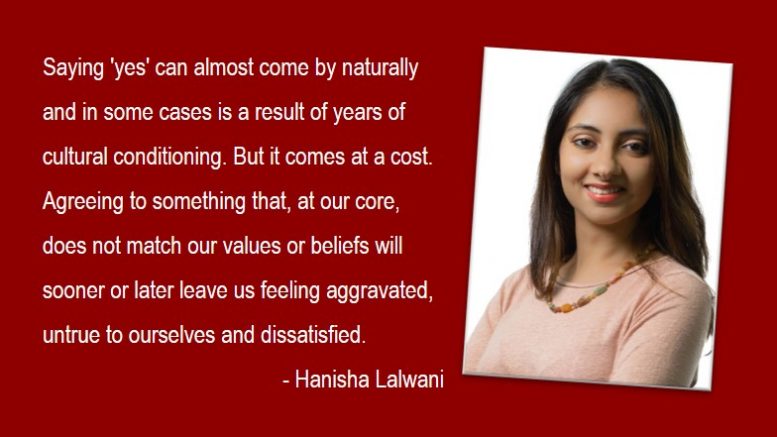Strategic change undoubtedly requires breaking existing organisation cultures. For too long, the workplace has been plagued with the ‘yes culture’. We live in the 21st century and it is surprising how saying ‘no’ is still taboo. We shy away from the ‘no’ word fearing implications. So we opt for the easy way out – we simply say ‘yes’ mostly to avoid repercussions, confrontations (read difficult conversations), and sometimes even to please people at the office – it could be the boss, the manager and the colleague. Saying ‘yes’ can almost come by naturally and in some cases is a result of years of cultural conditioning. But it comes at a cost, mostly a personal one. Agreeing to something that at our core does not match our values or beliefs will no sooner or later leave us feeling aggravated, untrue to ourselves and dissatisfied. When we experience this inner dissonance, how can we be at our productive best? How can we impact change within our organisations if we cannot even transform our often self-hurting habit of saying ‘yes’? It is time to disassociate the word ‘no’ from negative connotations.
When we say no, we are… adding value to the organisation. Let’s face it, when we are hired, we are brought in for our experience, thoughts and ideas to advance the cause of the business. The best managers don’t hire people just because they share similar views. So if we disagree with our boss, manager or colleague’s point of view, let us attempt to avoid the ‘yes’ approach. We should find our voice; have the courage to disagree with them albeit respectfully and present our opinion or idea, even if it means going against the grain. We need to make ourselves heard – after all weren’t we hired to add value to the organisation? If there is no friction or debate, how will better ideas ever evolve? When we say no, we are… saving time. In today’s fast-paced world, time is currency. To get a mounting number of job tasks and home chores done, one must be very frugal with giving away their time to everyone who asks for a share of it. At work, in an attempt to project ourselves as passionate employees, we tend to be very quick with saying ‘yes’ and taking on more tasks than we can realistically manage. Shortly after, we feel the pressure and wonder why we have no time left to do the things we really want to do. It’s time to start saying ‘no’. When we say ‘no’ (ensuring our reasons for the same come from a sincere place), we make our stance clear, automatically bypassing banter and small talk. We begin valuing our time, get others to respect our time as well, and in the process avoid feeling overwhelmed and irked. Think about it, in a way, when we say ‘no’, we are actually saying ‘yes’ – yes to much-needed downtime as well as some creative thinking and reflection space. When we say no, we are… gaining self-respect.
Jumping on the bandwagon is easy, but will it give you fulfilment? It takes bravery to make our voice and opinion heard, even if it means we are the only one in the room holding that belief. Saying ‘no’ is a tremendous way of instilling a sense of self-respect and confidence. Let us not agree for the sake of it. Let us push the boundaries and say no if we really believe so; especially if our justifications are sincere and not short-sighted.
As communications professionals, we should be leading the pack and encouraging the use of this two letter word. When our gut tells us, let us say no. It is certainly not easy to do so, but it like anything else, it requires practice. No can truly mean saying yes to new opportunities, greater possibilities, impactful results and fresh insights. Pushing the needle and bringing about strategic change can start with ‘NO’.
The views expressed here are that of the author and do not necessarily reflect that of Reputation Today.



Be the first to comment on "Change requires brave communicators to say NO"